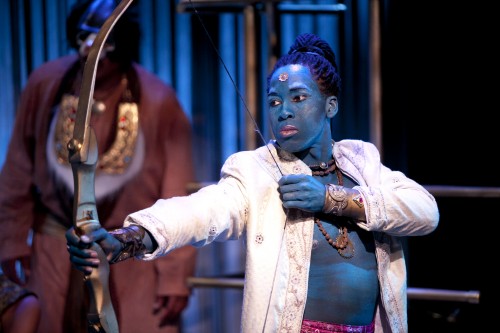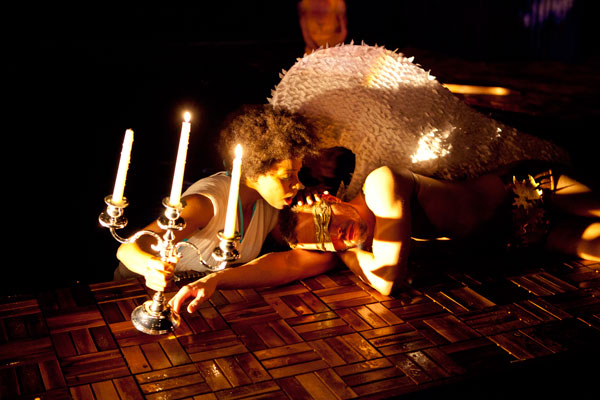|
Jacqueline Lawton: Why did you decide to get into theatre? Was there someone or a particular show that inspired you?
Allison Stockman: I was in a community theatre production of Snow White in first grade and I was immediately hooked. Since then there has never been a year without at least one show, if not five. I love the live community experience and I love being part of a collaborative art form. JL: How long have you served as Artistic Director at your company? What drew you to the position? What keeps you there? AS: I have been the Artistic Director of Constellation Theatre Company since founding it in 2007, six years ago. Throughout my life I’ve been drawn to leadership roles and to the theatre so being an Artistic Director is a great fit. I started Constellation because I wanted to direct epic, ensemble plays that emphasize the interdisciplinary nature of theatre – uniting elevated language, visual spectacle, original music and heightened movement. I wanted to develop a community of artists that love to work together and it often feels like a family. JL: What is the most valuable lesson you learned during your tenure? Also, what skills and traits do you feel a successful artistic director should have to support the health and growth of an organization? AS: I am learning new lessons everyday. Currently I am focusing on strategic planning and trying to imagine the future of the company in one year, in five years. A successful artistic director has to have a passion for the mission of the company. They should value and respect everyone associated with the organization, from artists to technicians, from donors to ushers. It’s a challenge, but I always try to remember that it has to be fun. No one is getting paid enough for it to be anything else. Don’t be shy to ask for money – you’re giving people an opportunity to be involved. (She says to herself, looking into the mirror;) JL: What excites you most about being an Artistic Director? AS: I love fostering good matches between directors, actors, designers, other artists etc. I love to think about how we can best serve the play in a way that is imaginative and exciting. JL: What is the greatest challenge you faced being an Artistic Director? AS: My greatest challenge is season selection. Deciding what plays to do is so important and there are so many aspects to consider: Does it fit the mission? Can we achieve success with this play in our space, on our budget? How does one play balance with others in the season? Will we be able to draw an audience? JL: If your work as an artistic director doesn’t pay the bills, what else do you do? Also, how do you balance your role leading an organization with your work as a director? Are you ever able to direct outside of your company? AS: Since I started Constellation I’ve been able to direct workshops, readings, gala performances, but I haven’t been able to commit to a full rehearsal process. Now, I finally feel like I would be able to direct elsewhere and Constellation would be able to continue our schedule without my being around quite as much. I would love the opportunity to direct at another theatre in the near future. Constellation benefits from every guest director that we bring in; I would love to be in the creative process at a different theatre and see how their practices differ from ours. JL: Looking at your body of work as an artistic director and a director, how conscious are you and selecting plays by women or people of color when deciding your season? Also, when it comes to hiring administrators, designers and other directors do you take race and gender into consideration? AS: Constellation tells stories from all over the world so there is an internationally diverse aspect to what we do. We strive to do plays that reveal the vast range of the human experience and so we embrace different perspectives. It’s exciting to collaborate with all kinds of people, diverse in race, age, culture, sexual orientation, religion, experience, etc. Of the three guest directors Constellation has had so far, two are women. This is great, but not particularly by design. I love their work. JL: DC audiences are ... AS: ... curious, enthusiastic, well-educated JL: DC actors and designers are ... AS: ... dedicated, inspired, friendly JL: DC playwrights are … AS: … imaginative, brave, inventive JL: DC critics are ... AS: … unpredictable JL: What advice do you have for an up and coming theatre artists who have just moved to D.C.? AS: Get to know as many people as possible. Accept any opportunity to practice your craft that isn’t morally objectionable. Take the initiative to create art on a small scale. Investigate the Fringe. JL: What's next for you as a director and your company?? AS: We’re opening Zorro next week. It’s our first world premiere and I’m incredibly excited. While that swashbuckling adventure entertains DC audiences, we will be designing one of the oldest stories in the world, the epic Gilgamesh.
0 Comments
Your comment will be posted after it is approved.
Leave a Reply. |
My BlogI'm a playwright, dramaturg, and teaching artist. It is here where you'll find my queries and musings on life, theater and the world. My posts advocate for diversity, inclusion, and equity in the American Theatre and updates on my own work. Please enjoy!
Categories
All
Archives
June 2020
Reading List
|



